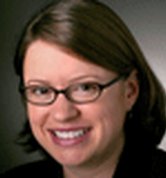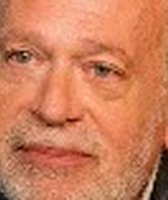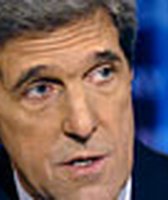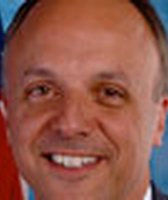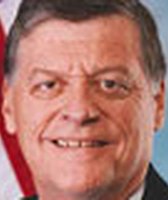Stand up for the facts!
Our only agenda is to publish the truth so you can be an informed participant in democracy.
We need your help.
I would like to contribute
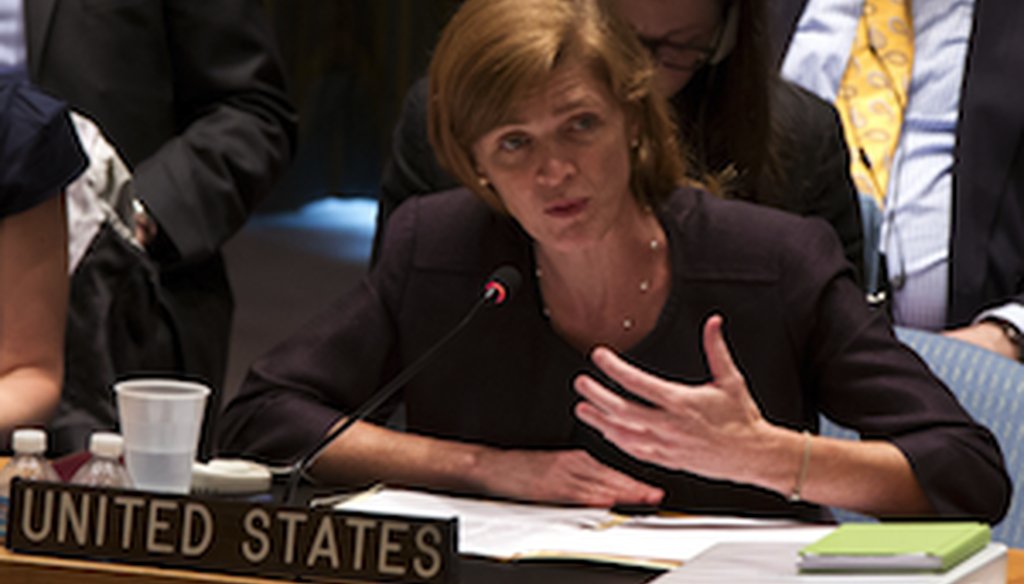
U.S. Ambassador to the United Nations Samantha Power addresses the U.N. Security Council on Aug. 6, 2013. (AP photo)
Diplomacy and fact-checking are a tough mix.
Consider one popular American talking point on Russia and the United Nations. Russia’s been so obstructionist, goes the recent line, it’s opposed innocuous press releases from the U.N. Security Council about Syria.
That’s probably true. But independently confirming it is another matter.
Yes, the Security Council does have open meetings, with video and public records and all the trappings of formal international governing. But it also holds closed meetings without transcripts. And even more informally, some members hold confidential consultations with one another.
Sometimes, the whole group gets together informally. Sometimes it’s just a few members.
So if the five permanent members of the council — China, France, Russia, the United Kingdom and the United States — want to try to reach an informal consensus, they might quietly consult together before bringing something to the full council.
The reason for that is pretty simple (though it drives other countries with nonpermanent rotating membership nuts): The permanent five each have veto power. If a draft resolution or statement can’t make it through the five, it’s not going to make it past the full body of 15.
That’s true even of a press release from the Security Council, more formally called a "press statement" that’s made on behalf of all 15 members.
That brings us to some recent American claims:
• U.S. Sen. Robert Menendez, D-N.J., told CNN’s Crossfire that Russia "voted against a simple press release, applauding the opportunity for the United Nations to send inspectors in" to Syria.
• U.S. Rep. Chris Van Hollan, D-Md., told reporters, "After all, the Russians went from vetoing press releases at the United Nations that even mentioned chemical weapons for the last three years."
• U.S. Rep. Adam Kinzinger, R-Ill., told CNN host Jake Tapper, "Well, you know, look, these are the same Russians that vetoed any press release out of the United Nations, basically saying chemical weapons are bad, period."
We know what press statements the Security Council ultimately did issue, which include just one this year on the subject of Syria. But for those they didn’t: How do lawmakers know?
A spokesperson for Menendez, who chairs the Senate Foreign Relations Committee, sent us a staff document that listed a series of recent examples of Russia blocking press statements within the permanent five Security Council members.
One press statement on Aug. 6, 2013, it says, would have simply welcomed the news that a U.N. team would be investigating three Syrian sites for chemical weapons use and called for full, unfettered access.
Russia’s disagreement would have happened confidentially between the United States, the United Kingdom, France and China, though. It’s an informal process that’s not a matter of public record.
Results of such discussions tend to be widely circulated, said Thomas Weiss, a professor of international relations and director of the Ralph Bunche Institute. So American lawmakers may hear about them, but they’re not public.
"You would have to take this on faith, or from someone who was there," he said.
The U.S. ambassador to the United Nations, Samantha Power, has made her own public claims that Russia has blocked resolutions and press statements.
"This year alone," she said on Sept. 6, 2013, "Russia has blocked at least three statements expressing humanitarian concern and calling for humanitarian access to besieged cities in Syria. And in the past two months, Russia has blocked two resolutions condemning the generic use of chemical weapons and two press statements expressing concern about their use."
But independent confirmation is beyond reach.
We asked the Russian mission to the United Nations, where a press contact asked us to send them email, but they didn’t immediately respond. And we suspect Russia’s response might have been similar to what the U.S. mission told us: It can’t confirm anything on the record.
At the United Nations, where each month a member country takes on responsibilities as council president, a spokeswoman for Australia reminded us that Security Council consultations are confidential.
"It is not possible for Australia in our capacity as council president to provide any details of discussions that may have occurred on a possible press statement on Aug. 6," said Chelsey Martin.
She apologized she couldn’t be more helpful.
So as rival claims of wartime outrage circulate based on classified reports and secret surveillance, know this: In international diplomacy, it’s hard to get on-the-record, independent confirmation of something as simple as a press release.
Our Sources
CNN Transcripts, Crossfire: Syria Breakthrough Possible; Interview with Sens. Rand Paul And Robert Menendez, Sept. 9, 2013
U.S. Senate Committee on Foreign Relations, "MENENDEZ SPEAKS ON SENATE FLOOR ON AUTHORIZING THE USE OF FORCE IN SYRIA," Sept. 9, 2013
CQ Newsmaker Transcripts, "Rep. Van Hollen Holds Media Availability on Syria," Sept. 11, 2013, subscription only
CQ Newsmaker Transcripts, "Reps. Kinzinger and Gabbard Interviewed on CNN," Sept. 10, 2013, subscription only
U.S. Mission to the United Nations, "Remarks by Ambassador Samantha Power, U.S. Permanent Representative to the United Nations, on Syria at the Center for American Progress, Washington D.C.," Sept. 6, 2013
New York Times, "A Plea for Caution From Russia: What Putin Has to Say to Americans About Syria," Sept. 11, 2013
U.N. Security Council, "Press Statements," accessed Sept. 11, 2013
U.N. Security Council, "Working Methods Handbook," accessed Sept. 11, 2013
U.N. Security Council, "Frequently Asked Questions: What is the difference between open and closed meetings and consultations?" accessed Sept. 11, 2013
U.N. Security Council, "Provisional Rules of Procedure: Chapter IX: Publicity of Meetings, Records," accessed Sept. 11, 2013
U.N. Security Council, "Meetings Records," accessed Sept. 12, 2013
U.N. Security Council, "Meetings Records: Meetings conducted / Actions taken by the Security Council in 2013," accessed Sept. 12, 2013
U.N. Security Council, "SECURITY COUNCIL PRESS STATEMENT ON HEAVY FIGHTING IN AL-QUSAYR, SYRIA," June 7, 2013
U.N. Security Council, "SECURITY COUNCIL PRESS STATEMENT ON CEASEFIRE IN SYRIA," Oct. 24, 2012
U.N. Security Council, "SECURITY COUNCIL PRESS STATEMENT ON TERRORIST ATTACKS IN ALEPPO," Oct. 5, 2012
U.N. Security Council, "SECURITY COUNCIL PRESS STATEMENT ON SHELLING OF TURKISH TOWN BY SYRIAN FORCES," Oct. 4, 2012
U.N. Security Council, "SECURITY COUNCIL PRESS STATEMENT ON ATTACKS IN SYRIA," May 27, 2012
U.N. Security Council, "SECURITY COUNCIL PRESS STATEMENT ON TERRORIST ATTACKS IN SYRIA," March 21, 2012
U.N. Security Council, "SECURITY COUNCIL PRESS STATEMENT ON SYRIA," March 1, 2012
U.N. Security Council, "SECURITY COUNCIL PRESS STATEMENT ON TERRORIST ATTACKS IN DAMASCUS, SYRIA," Dec. 23, 2011
U.N. Security Council, "SECURITY COUNCIL PRESS STATEMENT ON ATTACKS AGAINST DIPLOMATIC PREMISES IN SYRIA," Nov. 15, 2011
U.N. Security Council, "SECURITY COUNCIL PRESS STATEMENT ON EMBASSY ATTACKS IN DAMASCUS," July 12, 2011
Email interview with Patricia Enright, communications director, Sen. Bob Menendez, Sept. 10, 2013
Email interview with Chelsea Martin, counselor, Australian Mission to the United Nations, Sept. 10, 2013
Interview with Thomas Weiss, professor of political science, director, Ralph Bunche Institute for International Studies, City University of New York, Sept. 10, 2013
